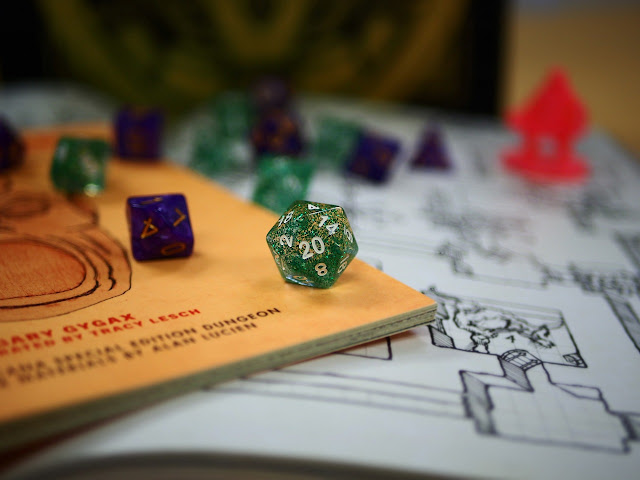As a middle-aged man who recently joined a group of fellow dads on a journey on Faerûn, within the world of Forgotten Realms, I have (re)discovered that engaging in roleplaying games has a significant positive impact on my mental health, anxiety levels, and overall demeanor.
After a few memorable game sessions over the last few weeks (I'm looking at you Godrim! 😂), I came to that realization and shared it with our Dungeon Master during a private conversation at the end of our latest session. Despite having had a rough day at work and feeling a lack of enthusiasm, once I had immersed myself in our virtual session (we play using Discord, D&D Beyond, and roll20), my worries faded away, and the fun began. As a results, I experienced a complete shift in my attitude and demeanor during that three-hour roleplaying session. I went to bed with a smile on my face. A little tired, but happy and fulfilled.
And recent studies corroborate these observations. Indeed, research supports the notion that these RPG games go beyond mere recreation and offer therapeutic benefits that enhance well-being. Recent studies have demonstrated that tabletop roleplaying games effectively reduce anxiety and improve social skills. Through a 12-week study conducted by experts from the Bodhana Group and the Harrisburg University of Science and Technology, it was revealed that participants who engaged in RPG sessions reported lower anxiety levels and demonstrated increased social skill scores - see all the articles I've listed at the end for all references mentioned here.
Furthermore, RPGs have provided a wide range of mental health benefits beyond anxiety reduction. They have become a platform for meaningful face-to-face interactions, even if they happen virtually through online tools. Engaging in RPGs fosters deeper connections with others and promotes themes of capability, self-confidence, and heroism. Within the immersive world of roleplaying games, we explore different identities and develop social skills in a safe and controlled environment. These games offer us opportunities for goal achievement, a sense of accomplishment, and the release of dopamine—the "feel-good" chemical in the brain—contributing to an overall positive mindset. Countless laughter-filled moments have been shared as we witnessed Godrim the Berserker, risking his Dwarvish arse in a melee with giants, regardless of the mortal danger he faced.
Another profound aspect of RPGs is their ability to provide an escape from real-life stressors. During gaming sessions, we can temporarily set aside our worries and engage in a constructive outlet for complex thoughts and emotions. The problem-solving, strategizing, and critical thinking required in these games challenges players cognitive abilities and stimulate brain development (more RPGs, more brain power!). Additionally, these experiences teach us resilience as we navigate failure within the safe confines of the game, imparting valuable life lessons and creating stories worth retelling.
It's heartening to see RPGs gaining recognition and being utilized in therapeutic settings such as group therapy, telehealth sessions, and educational environments. These games facilitate communication, enhance social skills, and improve emotional well-being. The collaborative nature of RPGs nurtures teamwork and empathy, while the roleplaying aspect allows us to explore different perspectives and facets of our personalities through our characters. The resurgence of RPGs, driven by increased media exposure (thank you very much "Dungeons & Dragons: Honor Among Thieves" and Joe Manganiello!) and diverse player communities, has solidified their position as a valuable tool for mental health support. And you thought you were doing this just for fun!
Beyond the undeniable fun and captivating stories, engaging in tabletop roleplaying games like D&D has been proven to decrease anxiety, improve social skills, and instill a greater sense of self-confidence in all who have the chance to experience them. These games provide an escape from real-life stressors, a platform for personal growth, and an enjoyable means of promoting mental well-being.
Reflecting on my own journey, I can't help but be grateful for the resurgence of RPGs and the significant role they now play in supporting mental health, particularly for those who may struggle with social connections and self-expression (certainly not my case though).
From my teenage years as an unsure and somewhat insecure kid to now, more than three decades later, I have witnessed the transformative power of RPGs in my life, and I wholeheartedly embrace their potential for others in similar situations.
Further readings:
- Mental Health Benefits of Role-Playing Games
- Tabletop roleplaying games may reduce anxiety and improve social skills
- Dungeons and Dragons as Therapy? How This Popular Game Helps Mental Health
- Therapeutic Use of Role-Playing Game (RPG) in Mental Health: A Scoping Review
- Mental Health Benefits of Role-Playing Games
- The well-being of playful adults: Adult playfulness, subjective well-being, physical well-being, and the pursuit of enjoyable activities
- Role-play Games (RPGs) for Mental Health (Why Not?): Roll for Initiative
- How role-playing games can give your kid a mental health boost
- Why playing games is good for you











No comments:
Post a Comment